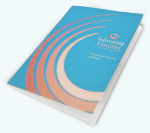Communicating the news to a family that their child has, or may have, a disability, can be an emotionally challenging and difficult task. Research has consistently shown the importance of this communication, as it is very often the beginning of the parent-professional relationship. It is very important to establish trust from the start of this relationship.
 Recognising the importance of the communication of the news of a child's disability, a set of best practice guidelines was developed in Ireland to support professionals in this task. The guidelines are robustly evidence-based, and came about through a substantial national research project. The guidelines provide practical recommendations in areas such as communication skills, ensuring the right people are present in an appropriate environment, teamwork, and advice on information provision.
Recognising the importance of the communication of the news of a child's disability, a set of best practice guidelines was developed in Ireland to support professionals in this task. The guidelines are robustly evidence-based, and came about through a substantial national research project. The guidelines provide practical recommendations in areas such as communication skills, ensuring the right people are present in an appropriate environment, teamwork, and advice on information provision.
The National Best Practice Guidelines for Informing Families of their Child’s Disability fall into two sections; Guiding Principles and Best Practice Recommendations. The Guiding Principles apply regardless of the circumstances of disclosure. The recommendations are non-prescriptive, and in addition to being informed by the above principles will require adaptation to the circumstances of
disclosure, including:
- Hospital / community / disability service setting / family home
- Ante-natal diagnosis / diagnosis at birth / evolving diagnosis
- Physical / sensory / intellectual / multiple disabilities and autistic spectrum disorders
- Unexpected event / predicted disclosure following assessment or tests
Guiding Principles
Whilst every disclosure event is unique, the National Best Practice Guidelines for Informing Families of their Child’s Disability have identified that the following Guiding Principles should be applied in every case.
1. Family Centred Disclosure
Disclosure must be family-centred and tailored to the emotional and informational needs of each individual family. The family should be provided with choice and options in the support that they receive during the disclosure process (e.g. family-friendly appointment times, private accommodation, contact with other families, counselling, etc.).
2. Respect for Child and Family
At all times it is necessary to demonstrate respect for the child and family. This should include using the child’s name, acknowledging and supporting the family’s dignity, emotions and reactions, and respecting cultural and linguistic diversity.
3. Sensitive and Empathetic Communication
Sensitive communication that is open, honest, empathetic and understanding is essential.
Whilst unavoidable difficulties in implementing best practice in other areas may be understood by parents, blunt or insensitive communication invariably leads to significant and lasting dissatisfaction.
4. Appropriate, Accurate Information
Meeting the family’s information needs is a key priority that influences subsequent levels of
parental stress and satisfaction. It is essential to pace the information in accordance with the needs of the individual family; (including how recently they have received the diagnosis, any current medical needs, and potential levels of distress or shock) to provide sufficient information whilst avoiding information overload.
5. Positive, Realistic Messages and Hope
Realistic, positive messages and hope should be given with the diagnosis - not merely the worst case scenario. The emphasis should be on the child first, and the disability second. Encouraging staff members to support parents who wish to celebrate their child may include disability awareness training and an exploration of various definitions of hope which parents find appropriate and helpful (e.g. reassurance that support and help are available).
6. Team Approach and Planning
Informing a family of their child’s disability is a process rather than a once-off event.
Preparation, planning, team work, close communication between staff members and liaison between agencies/service providers is essential to successful implementation of best practice.
7. Focused and Supported Implementation of Best Practice
Support for implementation of the Guidelines is required at all levels, including management, to ensure that planning takes account of the need for appropriate physical environments; provides for information ownership; and facilitates agreed protocols for dealing with different disclosure scenarios.
Specific Recommendations
The findings of the consultation and research led to specific recommendations in a number of key areas that are relevant to the process of informing a family of their child’s disability. To see the recommendations you can click the links below, or use the side navigation bar at the left hand side of this page.
1.The Setting/Location and the People Present at Disclosure
2.Sensitive and Empathetic Communication
3. Information and Support
4. Culture and Language
5. Training, Education and Support for Professionals
6. Organisation and Planning
7. Referral
8. Dissemination